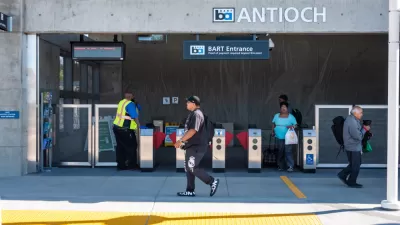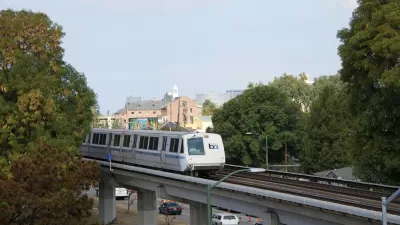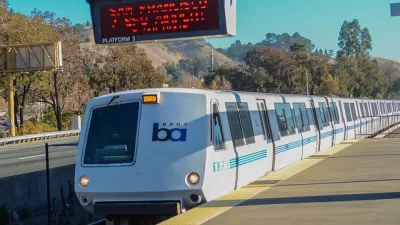Cities can't have it both ways on the housing crisis, asserts an SF Chronicle editorial. Case in point: Berkeley passes a resolution to declare homelessness a state of emergency while opposing legislation to allow BART to develop its parking lots.

"The Berkeley City Council went on record Tuesday [May 29] solemnly urging [#21 in agenda] the governor to declare homelessness a statewide emergency while noting its own 'comprehensive' efforts to grapple with the housing shortage," states the San Francisco Chronicle editorial of May 30.
At the same time, the council formally objected to legislation [#17 in agenda] that might allow new apartments to encroach on the ocean of asphalt surrounding the North Berkeley BART Station.
The bill, AB-2923: San Francisco Bay Area Rapid Transit District: transit-oriented development, would require the BART board to zone the currently unzoned BART parking lot for transit-orient development, consistent with its well-established TOD guidelines. Berkeley would have to update its zoning code for the area with two years. At least 20 percent of the units would have to be affordable.
Opponents, such as the American Planning Association, California Chapter, "argue that the bill would override local planning efforts, including longstanding General Plan land use plans in built-out communities," according to the May 26 legislative analysis.
"The pair of resolutions neatly captured the hypocrisy behind California’s housing crisis, with officials loudly deploring the inadequate supply of homes while digging in against any substantive expansion thereof," opines the editorial board.
“There’s incredible irony in the fact that cities opposing the bill ... are at the same time decrying the housing and congestion crisis,” said Assemblyman David Chiu, D-San Francisco, an author of the legislation. “It’s classic NIMBY-ism.”
The resolution [see May 29 annotated agenda, #17] to oppose the legislation, unless amended in the ways indicated, passed on a 5-4 vote, with Mayor Jesse Arreguín voting with the majority. Three other East Bay cities with BART stations, Hayward, Lafayette, and Concord, whose assemblyman, Tim Grayson, is a co-author of the bill, also oppose AB 2923, along with the League of California Cities.
The bill's two co-sponsors are the State Building & Construction Trades Council of California and the Non-Profit Housing Association of Northern California.
Unlike the much-discussed SB 827, which would have affected the zoning of large amounts of urban land well-served by transit bill, e.g., 96 percent of San Francisco, "AB 2923 would affect a total of a few hundred acres occupied mostly by surface parking lots, Chiu said, and it wouldn’t prevent any development from providing parking," notes the Chronicle. “When you look at the overall land-use authority of these cities, it’s a drop in the ocean.”
While SB 827 died in its first committee hearing on April 17, AB 2923 has passed three Assembly committees and will soon come before the full Assembly.
Hat tip to MTC News Headlines.
FULL STORY: Editorial: BART housing bill exposes lots of hypocrisy

Alabama: Trump Terminates Settlements for Black Communities Harmed By Raw Sewage
Trump deemed the landmark civil rights agreement “illegal DEI and environmental justice policy.”

Planetizen Federal Action Tracker
A weekly monitor of how Trump’s orders and actions are impacting planners and planning in America.

The 120 Year Old Tiny Home Villages That Sheltered San Francisco’s Earthquake Refugees
More than a century ago, San Francisco mobilized to house thousands of residents displaced by the 1906 earthquake. Could their strategy offer a model for the present?

Ken Jennings Launches Transit Web Series
The Jeopardy champ wants you to ride public transit.

BLM To Rescind Public Lands Rule
The change will downgrade conservation, once again putting federal land at risk for mining and other extractive uses.

Indy Neighborhood Group Builds Temporary Multi-Use Path
Community members, aided in part by funding from the city, repurposed a vehicle lane to create a protected bike and pedestrian path for the summer season.
Urban Design for Planners 1: Software Tools
This six-course series explores essential urban design concepts using open source software and equips planners with the tools they need to participate fully in the urban design process.
Planning for Universal Design
Learn the tools for implementing Universal Design in planning regulations.
Clanton & Associates, Inc.
Jessamine County Fiscal Court
Institute for Housing and Urban Development Studies (IHS)
City of Grandview
Harvard GSD Executive Education
Toledo-Lucas County Plan Commissions
Salt Lake City
NYU Wagner Graduate School of Public Service





























